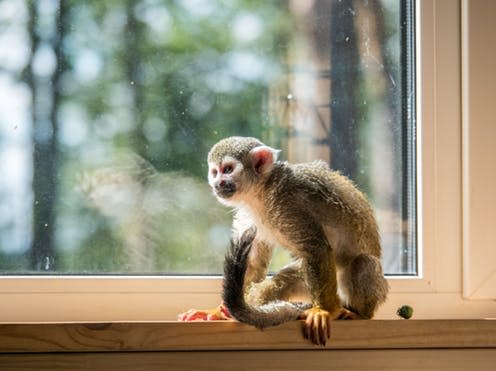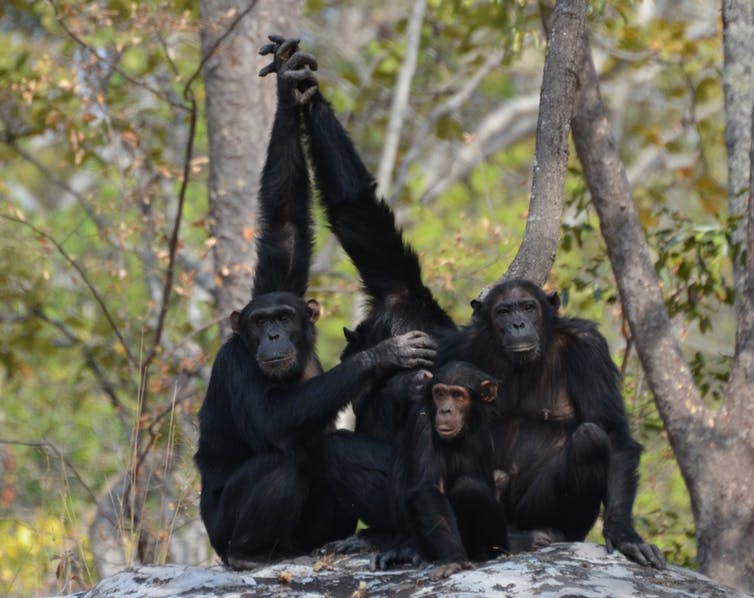Keeping monkeys as pets is extraordinarily cruel – a ban is long overdue

Most people will have seen at least one headline over the last couple of years describing animal attacks on humans. This needn’t include the elephant from a Zimbabwe National Park that trampled a tourist or the Sumatran tiger that killed a keeper who entered his zoo enclosure in Birmingham. There are numerous examples of attacks by wild pets on their owners, often whom they have known for years.
The pet, bottle fed from birth, having grown up in someone’s home like a child, suddenly “snaps” and causes major harm to a human family member, to the shock of both the public and the press. More often than not, these incidents involve pet primates – monkeys and apes – that have been purchased as one would any dog or cat. The problem is that dogs and cats are domesticated animals but primates are not.
Primates are a diverse group of over 250 species that live across five continents but are most commonly found in the tropics, from Uruguay to Uganda and Venezuela to Vietnam. They are wild, and attempts to domesticate them result in a mentally disturbed animal that no amount of training, beating or adoring will ever reverse.

There are an estimated 5,000 primate pets currently in UK households and a growing illicit trade in wild-caught animals. In response to this growing problem, the Labour Party has recently announced it would make training or keeping primates in homes illegal.
It’s a wonder that a political party even has to take this stance, although the debate is not a new one. The evidence that keeping pet primates is unsafe for the animals and their owners is overwhelming.
A long way from home
Matching the living conditions of a wild primate is impossible in the UK. Primates need nutrition, light, temperature and humidity that are consistent with the tropics not British households. A mismatch in any of these conditions in a captive primate’s environment can cause health issues, including vitamin and mineral deficiencies, respiratory infections and skin diseases.
Some primates, like the chimpanzee, are used to roaming across areas of up to 100 square kilometres in the wild. Even the very smallest species, like the common marmoset, have evolved to range across thousands of square metres. Confining large animals to small spaces impairs their development.
Like humans, primates are social creatures. But most people only want a single monkey for a pet, not an entire troop. So not only do primate pets suffer physically, they’re also socially deprived. We know from early experimental work that isolating these animals from their group causes profound social problems. In most cases, normal social behaviour can’t be recovered in pets that are later released. Human owners of especially young pet monkeys cripple the animals for life by removing them from their natural surroundings.

The health and safety of the human owner is also at risk in these situations. Most new infectious diseases that scientists discover are zoonotic, which means they’re transmitted from wildlife to humans. More often than not, we don’t know where the disease originates.
The most common of these is Ebola, the haemorrhagic fever that periodically rears its hideous head and spreads rapidly throughout central Africa and beyond, even recently reaching the UK. You only have to read up on the current Ebola outbreak and especially the early symptoms to want to keep your distance from any wildlife that might harbour it. Rhesus monkeys also carry a strain of herpes B virus that can be fatal in humans.
Then there are the unprovoked attacks. It’s tempting to think that loyalty trumps instinct and any primate raised with the love and devotion of a caretaker would reciprocate those sentiments in later life. This may be the case with domestic animals but not wild ones.
Pet owners underestimate the influence of millions of years of evolution. Adolescence, male aggression and female competition are natural and ingrained tendencies of wild animals that no amount of living with humans can erase. Failure to acknowledge or anticipate them is what often leads to these attacks, but such events are really just the animals exhibiting natural behaviour.
Read more: Stop portraying wild animals as cuddly companions (and potential pets)
Despite the good intentions of many pet owners, it’s nothing short of cruel to imprison primates in homes that are simply unfit for their living in nearly every regard. The Labour Party should be applauded for taking such a resolute stance.
Some will argue that outlawing the ownership of pet primates will only drive the industry underground, immunising it from the rules that currently govern acceptable conditions. But this logic could apply to any illegal behaviour, from kidnapping to owning guns. Surely, just because these things persist, it doesn’t mean we should legalise and attempt to regulate them.
The world’s remaining wild primates face extinction wherever they live naturally. Those who love primates enough to want to own them can support them by any number of more ethical and safe options, from supporting conservation work in the wild to volunteering at zoos and sanctuaries.
Educating people is what will protect these animals and also the humans that care about them. We still have an enormous amount to learn about our closest relatives. But Labour’s policy of outlawing pet primates is an important step towards reducing an otherwise harmful, if well-intended human threat to wild primates.
This article is republished from The Conversation under a Creative Commons license. Read the original article.

Alexander Piel is the director of GMERC, LTD, a Tanzania-based research and conservation group that studies wild primates.
Fiona Stewart is a co-director of GMERC, a Tanzania-based research and conservation group that studies wild primates

 Yahoo News
Yahoo News 
